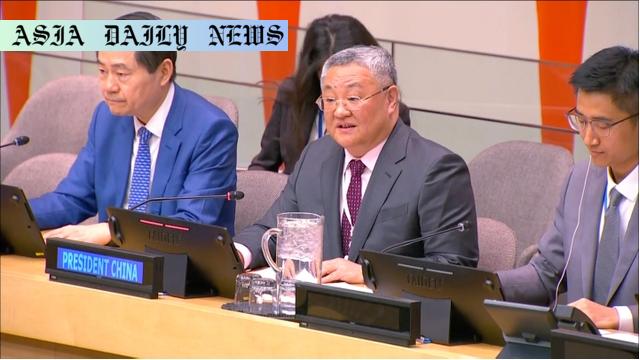Tariffs: China’s envoy condemns US tariffs, calls for unity in the global community at an unofficial UN Security Council meeting.

Introduction to the Tariff Conflict
The issue of tariffs, particularly those imposed by the United States, has been a point of contention in global economic and diplomatic discussions. During a recent unofficial meeting at the United Nations Security Council, China’s ambassador, Fu Cong, criticized US tariff policies, claiming their extensive and adverse effects on the global economic order. The meeting underscored growing global concerns, with representatives from many nations, including non-permanent members of the Security Council, engaged in the discussion.
China’s Position on the Global Stage
China’s ambassador Fu Cong did not hold back in denouncing US tariffs. He accused the policies of violating the foundational rights and interests of nations worldwide. According to the ambassador, these measures undermine trust in the rules-based multilateral trading system and cause further disruptions to an already fragile global economic order. Fu called for a unified response from the international community to counterbalance the economic disturbances caused by these tariffs. This appeal for solidarity reflects China’s attempt to rally global opinion against protectionist policies.
US Response: Defending Tariff Policies
The US response, represented by Ting Wu, was sharp and defensive. Wu dismissed the entire UN meeting on the matter as a ‘performative maneuver,’ suggesting that the motivations for convening the meeting were questionable. She further pointed at China’s actions rather than their words, urging the global community to scrutinize China’s actual contributions to the world trading system. In her concluding remarks, Wu reaffirmed the US’s commitment to advocating for a fair and competitive economic environment.
Other Global Reactions: A Divided Response
The UN meeting saw participation from a wide range of countries. Nations like Iran and Cuba openly supported China’s arguments and rallied against US tariffs. However, contrasting opinions also emerged. Countries such as Britain and South Korea expressed the view that the World Trade Organization (WTO), rather than the UNSC, would be a more appropriate forum to discuss trade-related issues. The absence of Japan, a prominent economic player in the region, was a noticeable development, leaving questions around its stance on the US-China trade conflict.
Implications for the Global Economy
The tariff conflict between the United States and China is not just a bilateral issue but one with far-reaching global consequences. Tariffs often lead to a chain reaction, affecting global supply chains, increasing production costs, and ultimately placing a heavier burden on consumers. With China and the US being two of the world’s largest economies, policies enacted by either party set precedents for the rest of the international economic system. As tensions escalate, the need for multilateral solutions has become more apparent, but achieving consensus remains a daunting challenge given the geopolitical divides.
Conclusion: Moving Toward Collaborative Solutions
The disputes over tariffs underscore a broader challenge facing the international community: finding effective mechanisms to mediate and resolve economic disputes in a rapidly evolving global order. While the UN serves as a platform for dialogue, the diverse opinions expressed during the session offer little immediate clarity. Consensus-building in such a polarized environment requires not only diplomatic finesse but also significant reforms to global economic institutions like the WTO to address 21st-century challenges. The global community must prioritize collaborative resolutions over unilateral actions to prevent further disruption of the fragile global economy.
Commentary
The Broader Context of US-China Economic Rivalry
The standoff in the United Nations Security Council over US tariffs is not an isolated incident but a clear reflection of the deepening economic rivalry between the United States and China. These kinds of debates showcase how two superpowers are vying not only for economic dominance but also for influence over the global narrative. Both parties seem intent on framing their actions as just and necessary, even though these measures have far-reaching implications that extend beyond their borders.
The Role of Multilateralism in Resolving Trade Disputes
This situation also spotlights a key dilemma: the current limitations of multilateral institutions. The WTO, theoretically the ideal forum for such disputes, has struggled to maintain relevance amidst increasing protectionism. Meanwhile, the UN offers a broader platform but lacks specialization in trade-specific issues. This leaves the international community in a precarious situation where the absence of well-functioning institutions to address trade disputes further exacerbates global tensions.
Necessity for Pragmatism Over Posturing
Both the United States and China must realize that rhetorical battles serve little purpose in addressing real economic challenges. Tariffs, while politically convenient, disrupt global supply chains, hurt businesses, and ultimately pass costs to consumers. It is critical for both nations to prioritize diplomatic engagement and meaningful negotiation over public posturing. Furthermore, smaller nations must leverage forums like the UN to advocate for less polarization and more harmonized economic policies that benefit the broader international community.
A Moment for Global Leadership
If there is any silver lining to these debates, it is the opportunity for other nations to step up and play a greater role in mediating these disputes. The challenges posed by the US-China trade rivalry underscore the pressing need for global governance reforms. As long as superpowers remain locked in tit-for-tat economic battles, global economic stability will be at risk. Only through collective effort and an unwavering commitment to fair practices can the international community navigate this turbulent period.


